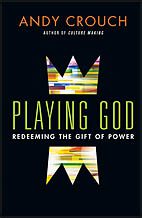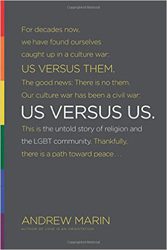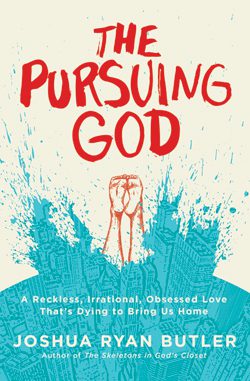 “Power is a gift” says Andy Crouch in his excellent new book Playing God: Redeeming the Gift of Power. Our use of power can either create or destroy, and power that leads to flourishing, Crouch notes, is grounded in our relationship with God. Crouch believes that the use of power is inevitable and can be good, and that it can be redeemed to serve the greater purposes of God and humanity; power, rightly used, can deepen rather than weaken our relationships and connections with others. As Paul Tillich demonstrated in his powerful text, Love, Power, and Justice, written five decades ago, power is a deeply theological issue.
“Power is a gift” says Andy Crouch in his excellent new book Playing God: Redeeming the Gift of Power. Our use of power can either create or destroy, and power that leads to flourishing, Crouch notes, is grounded in our relationship with God. Crouch believes that the use of power is inevitable and can be good, and that it can be redeemed to serve the greater purposes of God and humanity; power, rightly used, can deepen rather than weaken our relationships and connections with others. As Paul Tillich demonstrated in his powerful text, Love, Power, and Justice, written five decades ago, power is a deeply theological issue.
Crouch’s affirmation of the power as potentially positive begs the theological question, “Who is the God with whom we are in relationship and what images of God, noting that the Bible is a library of divine images, bring forth creative and life-affirming power?” Our images of God can inspire us to create or destroy, affirm or manipulate, empower or oppress. I believe that positive uses of power reflect a life-giving understanding of divine power. Negative uses of power reflect constricting and coercive understandings of God’s power.
One of my teachers Bernard Loomer spoke eloquently about two kinds of power – unilateral and relational. Unilateral power is one-sided, winner take all, coercive and domineering, and diminishes rather than inspires creaturely freedom and creativity. We can see this unilateral power in Stalinist Russia, Maoist China, North Korea, Assad’s Syrian regime, and the coercive tactics of USA preachers and politicians who espouse monolithic understandings of salvation or economic policy. There is no room in unilateral power, for questions, doubts, or alternative paths. Compromise is an anathema to such power hungry leaders; victory means destroying rather than finding common ground with persons of contrasting opinions.
Sadly, unilateral power has been a primary image of God throughout Christian history: God has been defined primarily in terms of sovereignty. God has all the power, creation has none. Any deviation from a preset divine purpose is seen as a fall from grace worthy of eternal damnation. We are perceived as inherently evil (the doctrine of original sin) while God alone is good. Grace is unilateral and often arbitrary, and never deserved. If we claim any goodness of our own, we affront divine majesty. God chooses the events of the world and even has chosen people to be “his” instruments of glory, who then can destroy those who are not chosen – infidels, doubters, free-thinkers, theological opponents, and indigenous peoples.
Tragically, the doctrine of divine grace intended as a sign of divine love has often been used as a form of punishment, exclusion, and oppression, when connected with a God whose favor requires the adherence to narrowly understood doctrines or the giving up of indigenous practices. Grace has been seen as unilateral and one-sided; its generosity has been domineering in its neglect of the unique gifts of creation, both human and non-human. While all gifts come from God, their positive embodiment emerges from creaturely decision-making and this needs to be acknowledged to have a life-supporting vision of grace.
In contrast to unilateral power, relational power follows the spirit of Philippians 2:5-11, the Christological hymn describing Christ’s victory as the result of Christ’s letting go of unilateral power in favor of power that brings salvation to all creation. First century Christians would have known the term Lordship and the phrase “every knee shall bend” from two perspectives: the perspective of Caesar and the perspective of Jesus. Caesar rules unilaterally by threat and domination. We bend our knees out of fear of punishment and exclusion. This power objectifies, dominates, and deadens the spirit. In contrast, first century Christians would have seen the power of Jesus as relational: we bend our knees out of love and gratitude, not fear. The power of Christ is for everyone; it does away with force and coercion, winning the day by love and affirmation. It is healing power. Theologian Thomas Oord rightly notes that often theologians have defined God primarily in terms of power, when the God of Jesus is known first and foremost by love. (see Oord, The Nature of Love) They have preferred the despotic Caesar to the Galilean image of Jesus of Nazareth. Often when I find myself in a theological discussion, I discover that such theologians and pastors would rather sacrifice love to omnipotence in their explanations of the impact on creation and humankind of natural disasters, the causes of terrorist acts, or the incidence of cancer or AIDS. Surely the most blatant images of divine unilateral and destructive power relate to explanations of natural disasters and the hoped-for (!) Second Coming of Jesus, who destroys the infidel and the good earth simply to save a faithful remnant.
Crouch’s project, in order to succeed, must jettison all images of sovereign power as unilateral and, frankly, question the appropriateness of the doctrine of original sin as a primary understanding of human life. We can’t help playing God: the issue is the nature of our models of divine power and how they shape and justify our own use of power. A relational vision nurtures relational power in which we work together and one another with God to heal the Earth. God needs us and cannot accomplish this alone; we are God’s companions in creative transformation. (For more on a relational vision of God, see Bruce Epperly, Emerging Process: Adventurous Theology for a Missional Church and Process Theology: A Guide for the Perplexed.)
Our visions of God need to embrace companionship above sovereignty. A companioning God is non-competitive and encourages creativity. The world is unfinished and open-ended. God rejoices in our efforts, even when they are imperfect. Even our imperfection provides God with opportunities for creativity and healing. Original sin is appropriately placed in the theological background and while we recognize and respond to our own and others’ sinful behavior, we see this in light of our original goodness and creation in God’s image. When we use creativity wisely, we expand the realm of divine creativity.
From this perspective, God is not a king, demanding absolute obedience or choosing only one final goal to history, but an artist, poet, and parent, exploring many possibilities of human well-being and planetary flourishing. The God we worship and trust, then, becomes the model for creative, life-supporting, and affirmative relationships that embrace everyone and not a chosen few. Grace empowers us to be graceful in affirmative rather than paternalistic and maternalistic ways. Following the redemptive God, we “play God” in ways that bring forth the value and divinity, the deepest humanity, in our personal and institutional behaviors.
Visit the Patheos Book Club for more conversation on Playing God.

















